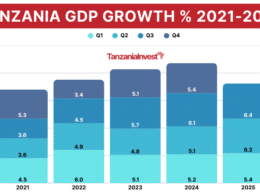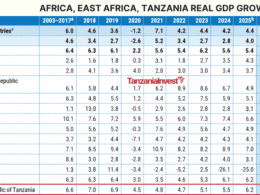The Bank of Tanzania (BOT) Monthly Economic Review for January 2017 shows that the value of export of goods and services in the year ending December 2016, increased by +5.2%.
Overall exports reached USD9,381.6m, compared to USD8,921.9m in the year ending December 2015.
The improvement was mainly driven by travel receipts (tourism), gold, and traditional commodities.
Travel maintained the leading position among foreign currency earners, before manufactured goods, gold, and traditional exports, with USD2,231.4m worth of exports in the year ending December 2016, showing a year-on-year increase of +11.01%.
The improvement in travel receipts is largely due to increases in the number of tourist arrivals; however, the volume of transit goods remained broadly the same as in the preceding year.
Gold exports increased by +22.5% to USD1,449.4m as a result of increase in export volume and recovery in prices in the world market.
Among Tanzania’s traditional exports, increases were seen in tobacco (USD312.7m, +8.73%), cashew nuts (USD270.6m, +23.67%), cotton (USD46.8m, +54.97%), tea (USD44.7m, +1.59%), and cloves (USD39.3m, +63.07%).
There was also a rise in export value of other minerals (excluding gold), oil seeds, cereals, cocoa, wood products, and hides and skins.
World Commodities Prices
On monthly basis, average world market price of cotton went up, while those of coffee, tea, cloves and gold declined.
The price of gold decreased to USD1,157.4 in December 2016 from USD1,238.4 (-6.5%) due to firming outlook for higher interest rates in the United States, hence reducing the demand for gold as an alternative safe investment.
The slight increase in price of cotton to USD1.8 per kg (+0.6%) was on account of high global demand.
Prices of coffee fell to USD2.3 (-1.7%) per kg of Robusta and USD3.6 (-12.1%) per kg of Arabica coffee.
The price of coffee declined due to expected bumper harvests in Brazil, Colombia and Honduras, mainly owing favorable weather.
The decline in the price of cloves to USD7.9 (-1.3%) per kg and tea to USD2.9 (-1.3%) per kg was due to weak global demand.











